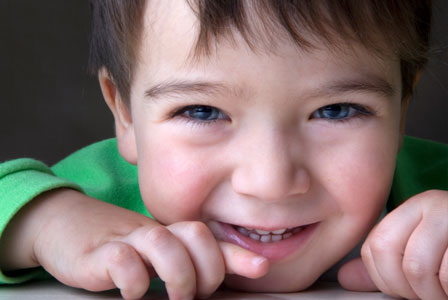Clik here to view.

Has your child surprised you by coming home from preschool with a potty mouth? Once preschool begins, children often find a way to incorporate the words “pee” and “poo” into every sentence — and they think it’s funny!
Keeping the potty talk at bay
While at first you might think it’s funny too, it will probably get old or embarrassing in public situations. Just know… You’re not alone! Here are some ways you can reduce the potty talk at home.
Why do preschoolers have a potty mouth?
Being the age of 3 comes with a lot of new and exciting things — potty training, new friends and an expanded vocabulary. These experiences introduce your child to new words that get noticeably different reactions — both good and bad.
Melissa Haulk is a mom to a 3-year-old boy and fought her husband about their son’s potty talk. “Our son started screaming 'poo poo' at the top of his lungs just one month after starting a new preschool. He got a laughing reaction from my husband, so he kept doing it wherever we went… It was hard to break him of it after that.”
Most 3-year-olds are also learning how to express themselves, but might not always have the proper words to do so. They often blurt out silly or inappropriate words to convey their message, but if the potty talk bothers you, there are ways to reduce it.
Kids and cursing >>
How to reduce the potty talk
Unfortunately, there’s no foolproof way to stop the potty talk altogether, but there are ways to decrease it. When your child is exposed to outside influences, older siblings or parent slip-ups, they tend to soak it up like a little sponge.
Watch what you say
Set limits or boundaries
Be serious about potty training
Encourage nice words
It’s very likely that your child will come home from preschool with a new knowledge of potty talk… Or you might have an older child influencing your preschooler and giving him the attention he craves just from being silly. Instead of disciplining your child for using potty talk, try to encourage the use of nice words or only mimic the nice words, feelings and expressions your child conveys.
10 Potty training secrets >>
How do other parents keep the potty talk at bay?
Holding back the laughs can be difficult, but if you don’t want your child to continue the potty talk, some doctors and behavior therapists suggest ignoring it — depending on the temperament of your child. By simply asking or telling your child to stop the potty talk, you are giving him attention — even if it’s negative attention.
“I try to stifle my laughter," says Sharon Pollard, a mom of two girls. “After a couple of jokes, I roll my eyes and say, “OK, enough of the potty talk.” I find that not making a big deal is the best way to make it stop.”
Samantha Hackett lets her 5-year-old daughter use potty talk, but only at home. “She knows not to take it outside of the house ," says Hackett.
More on preschoolers
10 Things our kids' preschool teachers want us to know
Best iTunes music for toddlers and preschoolers
The importance of play